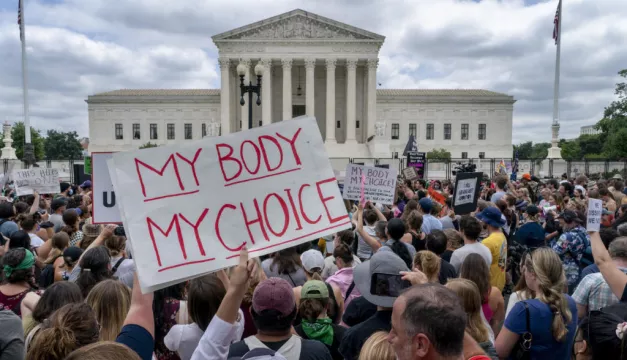The US supreme court has ended constitutional protections for abortion that have been in place for nearly 50 years by deciding to overturn the landmark Roe v Wade ruling.
It is expected to lead to abortion bans in roughly half of US states.
Here is what this all means:
What is Roe v Wade?
In January 1973, the US supreme court ruled that a woman’s right to terminate her pregnancy was a private matter and protected by the US constitution.
A few years earlier, a 25-year-old single woman, Norma McCorvey using the name “Jane Roe”, challenged the criminal abortion laws in Texas.
She successfully challenged Henry Wade, who was the district attorney for Dallas County.
What was the law on abortion before Roe v Wade?
At the time, abortion was illegal in Texas unless it was done to save the mother’s life.

It was a crime to get an abortion or to attempt one in 30 of the 50 states.
Abortion was somewhat legal in just four states and allowed under limited circumstances in 16 others.
What has happened?
The US supreme court overturned Roe v Wade, allowing individual states to ban it.
Justice Alito, in the final opinion issued on Friday, said that Roe and Planned Parenthood v Casey, the 1992 decision that reaffirmed the right to abortion, was wrong the day it was decided and must be overturned.
Authority to regulate abortion rests with the political branches, not the courts, Justice Alito wrote.
What are those who oppose this saying?
President Joe Biden has said “it’s a sad day for the court and the country”.
The decision came against a backdrop of public opinion surveys that find a majority of Americans oppose overturning Roe and handing the question of whether to permit abortion entirely to the states.
Polls conducted by The Associated Press-NORC Centre for Public Affairs Research and others also have consistently shown about one in 10 Americans want abortion to be illegal in all cases.
A majority are in favour of abortion being legal in all or most circumstances but polls indicate many also support restrictions especially later in pregnancy.
What does this mean for the US?
Thirteen states, mainly in the South and Midwest, already have laws on the books that ban abortion in the event Roe is overturned.
Another half-dozen states have near-total bans or prohibitions after six weeks of pregnancy, before many women know they are pregnant.

Abortion access is expected to be cut off for tens of millions of women of reproductive age, according to research from Planned Parenthood.







